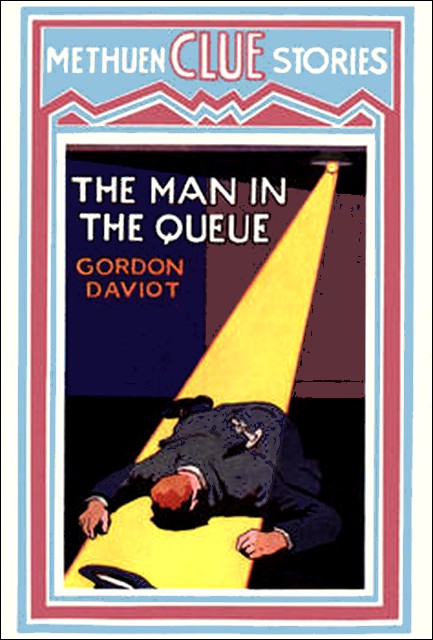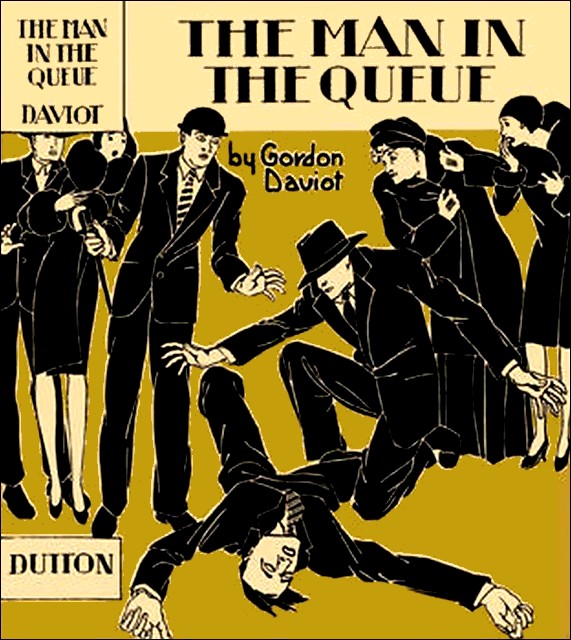Though I have read a couple of Josephine Tey’s Alan Grant novels, the #1929 club being hosted by Simon and Karen gave me an excellent opportunity to read his first case.

A widely popular stage show is winding up in a week and crowds are thronging to the theatre to see the beautiful actress Ray Marcable, who has become a nation-wide sensation in her debut, one last time before she sails for the US. When the novel opens, we find ourselves in a queue jostling to somehow purchase a ticket and get in though it has been announced that seats are already full and now people would have to stand and watch. No matter, the crowd is still full of enthusiasm and some lucky ones are even carrying books that they read as the interminably long wait in front of the window gets even lengthier. We too bear with it though one would like the author queue to get on with it. Just as one reaches the window though, commotion, a man suddenly kneels over and there is that ugly silver thing sticking out from his back. Who could have done this dastardly deed in full view of the theatre-goers and even a policeman? The woman behind him has hysterics as she tries to explain that there was a foreign -looking person in between her and the murdered man who has now disappeared. The sinister stiletto confirms to Grant the truth of the woman’s words for this foreign looking weapon and the way of murder confirm that it was no Englishman who would murder in such a manner. Stab him in the back! No. No. No. Very Un-English. Of course, it has to be one of those damned dagoes (in our PC world changed politely to Levantines).
If finding the foreigner is tough, Grant also has no idea of the murdered man. No laundry marks, no label of tailors, an anonymous ordinary good-looking bloke done to death. Why was the dead man carrying a loaded revolver though? Grants gets on the case with his juniors and significant progress is made till we reach Scotland in hunt of our quarry and then again pages and pages devoted to description of the Highlands and the crawl chase which ends in an arrest. But why isn’t Grant happy?

Grant is a sympathetic hero. Liked his relationship with his subordinates and especially loved the disguises that the policemen assume. There is also a brilliant cameo by a young painter who bursts on the scene with a Struwwelpter effect.

However, there were many things which had me rolling my eyes besides the commonplace crime of the foreigner. Here is the conversation between Grant and the Medical officer:
“Can you tell me anything about the dead man himself?” asked Grant, who liked to hear a scientific opinion on any subject.
“Not much. Well nourished—prosperous, I should say.”
“Intelligent?”
“Yes, very, I should think.”
“What type?”
“What type of occupation, do you mean?”
“No, I can deduce that for myself. What type of—temperament, I suppose you’d call it?”
“Oh, I see.” The surgeon thought for a moment. He looked doubtfully at his interlocutor. “Well, no one can say that for a certainty—you understand that?” And when Grant had acknowledged the qualification: “but I should call him one of the ‘lost cause’ type.” He raised his eyebrows interrogatively at the inspector and, assured of his understanding, added, “He had practical enough qualities in his face, but his hands were a dreamer’s. You’ll see for yourself.”
Together they viewed the body. It was that of a young man of twenty-nine or thirty, fair-haired, hazel-eyed, slim, and of medium height. The hands, as the doctor had pointed out, were long and slim and not used to manual work.
Scientific deductions!
The coincidences were also too many: The man has to work in that particular restaurant. A pedestrian walking in front of Grant suddenly turns around and lo behold it’s the wanted man! And after all the chases and leg-work and disguises and reasoning, a confession is needed for the solution.

Despite all the eye-roll I enjoyed the book. The friendship between the orphaned ex-soldiers held a certain pathos and the recollections were moving. Also if Miss Pym Disposes was the deconstruction of a detective tale, this novel is abut the pitfalls of the police procedural.
*
First Line: IT was between seven and eight o’clock on a March evening, and all over London the bars were being drawn back from pit and gallery doors.
Publication Details: 1929. London: The Macmillan Company, 1929
Altenate Title: Killer in the Crowd
Series: Alan Grant #1
Pages: 182
Source: Faded Page
Other Opinions (Among Others): Becky’s Book Reviews, Bitter Tea and Mystery, The Book Decoder, Classical Carousel, Eustea Reads, Ex Urbanis, Fleur in her World, Leaves and Pages, Mike Finn’s Fiction, Mysteries Ahoy!, Stewartry, Strange and Random Happenstance, The View from the Blue House,
Other books read of the same author: (Among Others): Miss Pym Disposes

I would have liked to re-read this one myself, but time ran out on me! I take your points, and I do recall this as not being her strongest book – I feel she gets into her stride later on in her books. But Grant is entertaining and the book has got a lot of love this week! 😀
LikeLiked by 1 person
Oh yes! a lot of people are reading it and in fact, have read the book as the number of reviews on the Net shows. Wonderful to see an author who is not Christie getting so much love and attention.
LikeLiked by 1 person
I actually felt very much as you do about this one, Neeru. It’s got some problems, not the least of which is that whole thing of ‘scientific evidence.’ And by today’s standards, there are ‘isms’ in the book. But Grant is a solid character, and it’s not hard to wish him well with this case. It’s an interesting premise, too, and I give Tey credit for that.
LikeLiked by 1 person
Margot, the ‘scientific-evidence’ was so mind-boggling that I had to read the passage a couple of times to ascertain whether I was reading correct:) Oh I am so glad you like Grant because I read a few reviews where they were really disparaging of him making me wonder whether I had read another book.
LikeLiked by 1 person
Thanks for linking to my review, Neeru. The first two times I read The Man in the Queue (both decades ago), I liked it a lot. When I reread this one last year, I was bothered by the ethnic slurs and the assumption that the criminal had to be foreign. But Tey’s writing is good enough to make reading it worthwhile.
LikeLiked by 1 person
You are welcome, Tracy. I think we all are much more oblivious when we are young. Recently, I read a book which made me feel irritated at certain assumptions which I am sure my younger self would have just laughed-off.
LikeLike
This is one of my favorites. Definitely need to reread it.
LikeLiked by 1 person
Yes, it is a good beginning to the series.
LikeLiked by 1 person
Haha, that conversation with the medical officer is hilarious – who knew they could tell so much! I guess she must have improved later…
LikeLiked by 1 person
Mind boggling, isn’t it, FF? Like you, I couldn’t stop giggling.
LikeLiked by 1 person